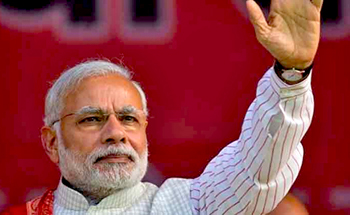New Delhi, May 27: Prime Minister Narendra Modi will embark on a two-day visit to Bangladesh beginning June 6 with an aim to inject new momentum in the bilateral relationship by enhancing cooperation in connectivity, economic and other areas.

PM Modi had earlier visited Nepal and Bhutan. Ties between India and Bangladesh are on an upswing ever since Hasina government came to power in January, 2009.
PM Modi will be visiting at the invitation of Ms Hasina who had extended the gesture through telephonic talk and writing a letter soon after PM Modi had led BJP to a landslide win in Lok Sabha elections in May, 2014.
Thereafter, the two leaders had met on the sidelines of the UN General Assembly session in New York in September last year and then again on the margin of SAARC Summit in Kathmandu in November the same year.
Earlier this month, Parliament had passed a historic constitution amendment bill seeking to settle India's 41-year-old border issue with Bangladesh. The bill will operationalise the 1974 India-Bangladesh Land Boundary agreement that provides for exchange of 161 enclaves adversely-held by the the two countries.
"This visit, Prime Minister's first to Bangladesh, reflects the importance attached by India to the bilateral relationship.
"The visit is expected to further expand the cordial and cooperative relationship between the two countries and strengthen the ties of friendship and trust between India and Bangladesh," the External Affairs Ministry said.
Ahead of PM Modi's visit to Dhaka, Union Home Minister Rajnath Singh said in Kolkata that India and Bangladesh would soon approve the long-pending Teesta river water-sharing agreement.
"Both the countries will give their approval to it very soon. We are hopeful that we will get full cooperation from West Bengal government", Mr Singh said.
Last week, Bangladesh had hoped that the pact will be inked during PM Modi's trip. The Teesta deal was set to be inked during the then Prime Minister Manmohan Singh's visit to Bangladesh in September 2011 but was postponed at the last minute due to objections by West Bengal Chief Minister Mamata Banarjee.
The Teesta water is crucial for Bangladesh, especially in the leanest period from December to March when the water flow often temporarily comes down to less than 1,000 cusecs from 5,000 cusecs every year.
PM Modi's programme also include a meeting with Bangladesh President Md Abdul Hamid.
In March, 2013, President Pranab Mukherjee had paid a visit to Bangladesh. Bangladesh is an important trading partner for India. The two-way trade in 2012-2013 was USD 5.34 billion with India's exports to Bangladesh accounting for USD 4.776 billion and imports USD 0.564 million.





Comments
Add new comment